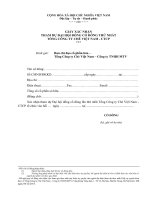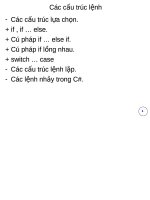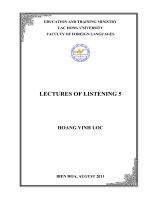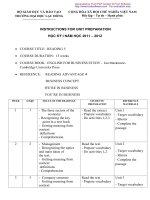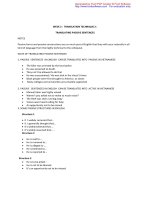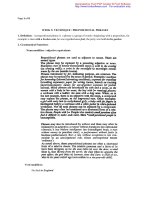Com LISTENING 3 VB1 PTNGHIA WEEK 3 4
Bạn đang xem bản rút gọn của tài liệu. Xem và tải ngay bản đầy đủ của tài liệu tại đây (2.83 MB, 13 trang )
Generated by Foxit PDF Creator © Foxit Software
For evaluation only.
Unit 3:
GOING ABROAD
Activity 1
Look at the pictures. Answer the following questions
1. Which countries are these pictures?
2. What do you think about these places? Do you know what their names?
3. Have you ever gone abroad/overseas? If yes, what country have you been?
4. Do you like going abroad?
5. What countries would you prefer to visit? Why?
6. What are the most popular tourist attractions in your hometown?
7. What three thing would you tell a tourist visiting your country to do or see?
Activity 2
[1], page 28, unit 5, Boost 2 Listening, Jason Renshaw and Wade O. Nichols
2.1 Complete the sentences using the words
Ground
visit
located
long
Generated by Foxit PDF Creator © Foxit Software
For evaluation only.
2.2 Listen to the lecture and take notes
[1], page 30, unit 5, Boost 2 Listening, Jason Renshaw and Wade O. Nichols
2.3 Circle the answer, using your notes to guide you. Then listen again to the lecture to check
your answer.
[1], page 31, unit 5, Boost 2 Listening, Jason Renshaw and Wade O. Nichols
2.3.1 Learn these words
_rise / raɪz/ rose /roʊz/: (+ adverb/preposition) to come or go upwards; to reach a higher level or
position
Generated by Foxit PDF Creator © Foxit Software
For evaluation only.
Ex: Smoke was rising from the chimney.
The river has risen (by) several metres.
_erode /ɪˈroʊd/ (v) to gradually destroy the surface of something through the action of wind, rain,
etc; to be gradually destroyed in this way
Ex: erode something (away) The cliff face has been steadily eroded by the sea.
erode (away) The rocks have eroded away over time.
Listen and choose the correct answer
Activity 3
[1], page 32, unit 5, Boost 2 Listening, Jason Renshaw and Wade O. Nichols
Generated by Foxit PDF Creator © Foxit Software
For evaluation only.
Activity 4
[2], page 43, unit 9B, Let’s Talk 2 by Leo Jones
IELTS Listening Strategies
[3],
Unit 2: Form filling and table completion
Activity 11
Generated by Foxit PDF Creator © Foxit Software
For evaluation only.
Activity 12
Activity 13
Generated by Foxit PDF Creator © Foxit Software
For evaluation only.
Activity 14
Generated by Foxit PDF Creator © Foxit Software
For evaluation only.
Activity 15
REFERENCES
[1], unit 5, Boost 2 Listening, Jason Renshaw and Wade O. Nichols
[2], unit 9B, Let’s Talk 2 by Leo Jones
[3], unit 2, IELTS Listening Strategies
Generated by Foxit PDF Creator © Foxit Software
For evaluation only.
Unit 4
GADGETS – INTERNET
Activity 1
1.1 Work Alone
[1], pages 44-45, unit 10, Let’s talk 2- Leo Jones
_gadget: /ˈɡædʒɪt/ (n) a small tool or device that does something useful
Generated by Foxit PDF Creator © Foxit Software
For evaluation only.
1.2 Pair Work: Describe how you can use the things in part A. Use the phrases in the box
and your own ideas
Check email
Find definitions
Find directions
Listen to music
Make calculations
Make phone calls
Record appointments
Send text messages
Store addresses
Store music
Translate words
Write letters
Ex: “You can use a cell phone to make phone calls” “You can also use it to send messages”
1.3 Work alone: How important are these things in your life? Mark them very important (√√),
somewhat important (√), or not very important (X)
_______an alarm clock
__________a CD/DVD player
_______a camera
__________a remote control
_______a TV
__________a computer
_______a cell phone
__________an MP3/MP4 player
Activity 2
2.1 Making Inferences: How and Why
Sometimes you will need to make inferences (=smart guesses) about how and why things happen
2.2 Let’s Listen
Activity 3
3.1 Write the answers
[2], Unit 11, Boost 2 Listening – Jason Renshaw
Generated by Foxit PDF Creator © Foxit Software
For evaluation only.
3.2 Listen and take notes
Generated by Foxit PDF Creator © Foxit Software
For evaluation only.
3.3 Listen again and do the task
Activity 4
Group work
[3], Unit 8, page 35, let’s talk 3 – Leo Jones
Work in groups. Complete these sentences. Use your own ideas. And then, compare your
ideas and give reasons
Activity 5
VOA Special English
Generated by Foxit PDF Creator © Foxit Software
For evaluation only.
How Much Screen Time Is Too Much for Children?
Children can spend hours a day looking at computer screens and other digital devices. Some eye
care ……………………………(1) say all that screen time has led to an increase in what they call
computer vision syndrome.
Nathan Bonilla-Warford is an optometrist in Tampa, Florida, with VSP, Vision Service Plan, a big
……………………..(2) provider. He says he has seen an increase in problems in children.
NATHAN BONILLA-WARFORD: “I see a lot more children who are coming into the office either
because their parents have noticed that they have ……………………….(3) or red or watery eyes or
discomfort, or because their prescription, their near-sightedness, appears to be increasing at a fast
rate and they're worried.”
Dr. Bonilla-Warford says part of the problem is that children may be more likely than adults to
ignore early warning signs.
NATHAN BONILLA-WARFORD: “Even if their eyes start to feel ……………………….(4) or
they start to get a headache, they’re less likely to tell their parents, because they don’t want to have
the game or the computer or whatever taken away.”
He says another part of the problem is that people blink less often when they use digital devices.
NATHAN BONILLA-WARFORD: “The average person who uses a computer or an electronic
device blinks about a third as much as we normally do in everyday life. And so that can result in the
front part of the ……………….(5) drying and not staying moist and protected like normal.”
Eye doctors offer suggestions like following what is known as the 20/20/20 rule.
NATHAN BONILLA-WARFORD: “Every twenty minutes, look away twenty feet or more for at
least twenty seconds from whatever device you’re using.”
Twenty feet -- that's six meters.
Other ………………………(6) include putting more distance between you and the device and
using good lighting. Of course, another way to avoid eye strain is to spend less time looking at
screens. Many experts say children should spend no more than two hours a day using
………………………(7) -- with no screen time for children under two.
But not all eye doctors have noticed an increase in problems in children. Dr. David Hunter says he
has not seen an increase in his practice as a pediatric ophthalmologist at Children’s Hospital Boston.
He also serves as a …………………..(8) for the American Academy of Ophthalmology.
Dr. Hunter thinks calling it a syndrome, as in computer vision syndrome, is a little much. He says
the real problem is simple.
DAVID HUNTER: "Spending too much time in one place, ……………………….(9) on one thing,
not looking away from their work, etc."
And while this might be tiring to the eyes, he says, it will not cause permanent damage.
Generated by Foxit PDF Creator © Foxit Software
For evaluation only.
DAVID HUNTER: “While it is possible to develop fatigue looking at various screens for a long
period of time, there’s certainly no ………………….(10) that it actually causes any damage to the
eyes.”
And that's the VOA Special English Technology Report, written by June Simms. You can learn
English and much more at voaspecialenglish.com. I'm Steve Ember

